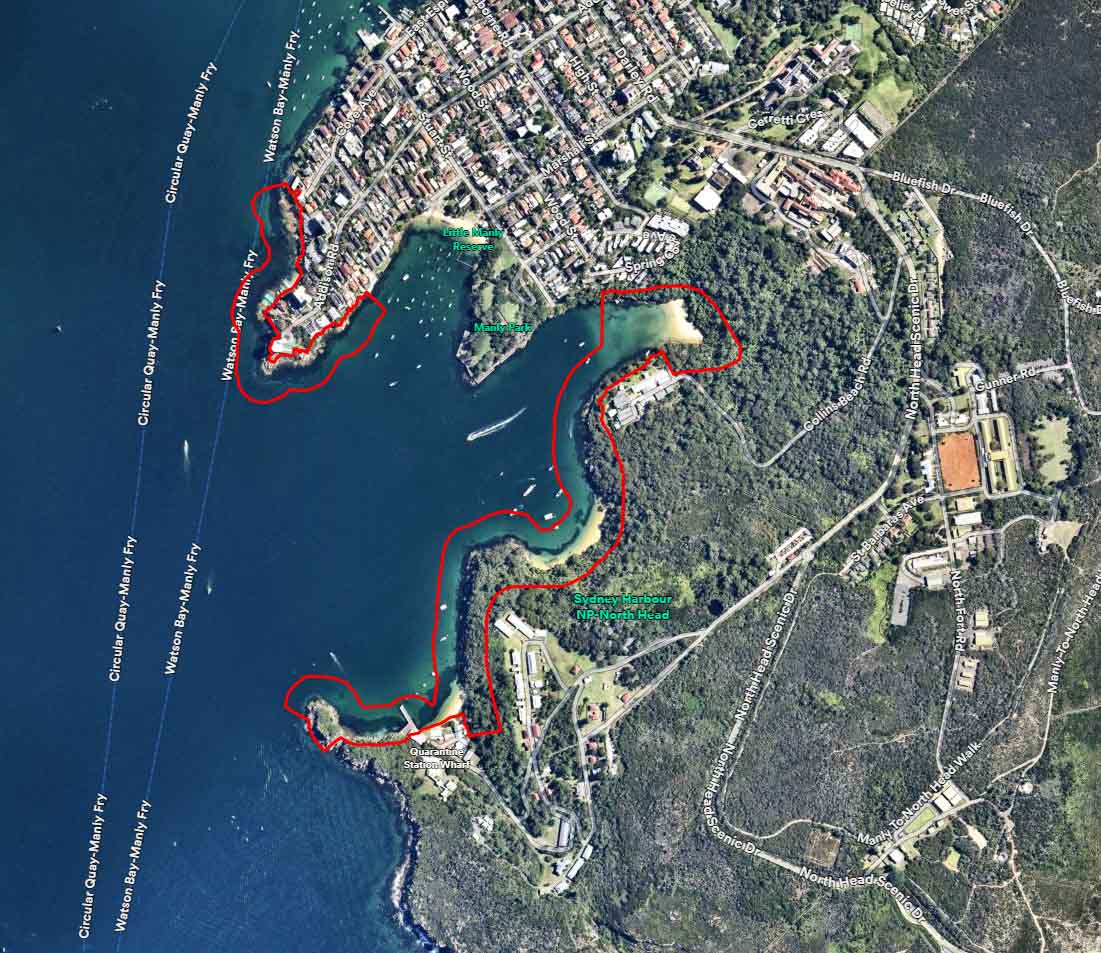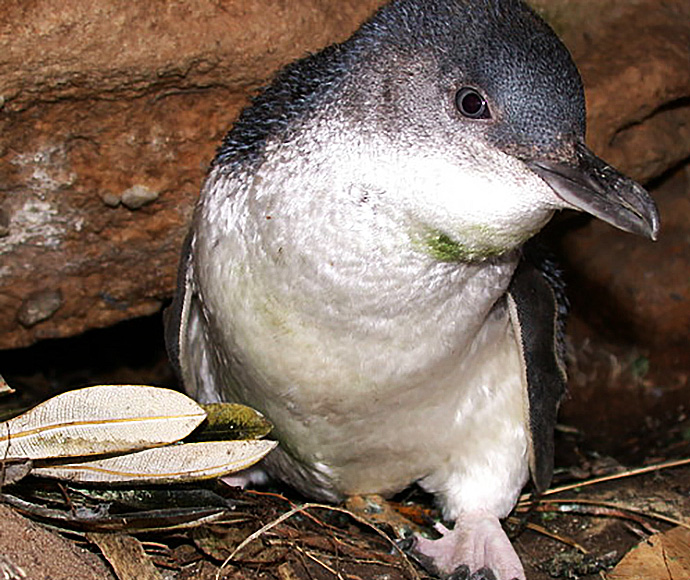Little penguins in Sydney
Sydneysiders are lucky to have a population of little penguins (Eudyptula minor) living close by. These penguins live in a hidden cove in Sydney's North Harbour and are the only breeding colony on the NSW mainland.
People have known about the little penguin colony at Sydney's North Harbour since the 1940s and 50s. Penguins also breed on more than 10 island sites in New South Wales, including Lion Island in Broken Bay and Five Islands off Port Kembla.
Little penguins look for food throughout Sydney Harbour and along the Sydney coast. You might see them around Bondi, Botany Bay, Mosman, Narrabeen and Vaucluse. Some of our penguins have even travelled as far as South Australia.
They come back to Manly each year to breed between May and February. They usually return to their burrows at sunset, when the darkness hides them from predators.
Unlike Phillip Island, near Melbourne, the little penguin population at Manly is small, so you might not see them in their natural habitat.
If you see a little penguin, please do not approach them or use flash photography as it disorientates them.
If you can't see penguins in the wild, visit some at SEALIFE Sydney Aquarium and Taronga Zoo.
How we protect little penguins
In 2002, the Manly colony was listed as an endangered population, and its important habitat was listed as Critical Habitat. This critical habitat is now known as an Area of Outstanding Biodiversity Value. This declaration was based on the biological needs of the little penguin population and the potential impact of known and unknown threats. Declaring this area an Area of Outstanding Biodiversity Value gives it more protection and stricter controls.

Threats to penguins
Being a small population in Sydney Harbour and connected to the mainland, the Manly colony faces various threats and is vulnerable to small environmental changes.
Foxes
Foxes can kill penguins easily, particularly in shallow burrows or moving between the water and their nests.
The NSW National Parks and Wildlife Service and other land managers run an ongoing fox monitoring program and take rapid action, including baiting, trapping and shooting to remove foxes when they are found. 1080 fox baits are laid all year at North Head.
Foxes pose a significant threat to our native wildlife. Any fox sightings in the Manly area should be reported on FoxScan.
Cats
Cats that are not kept indoors can easily stalk and kill penguins returning from the water or in their nests.
Cats are prohibited in the Area of Outstanding Biodiversity Value and there can be penalties for owners who let their cats roam in this important habitat.
If you own a pet cat, be responsible and keep your cat indoors, especially at night. This is not only good for penguins but for all native wildlife. Cats are responsible for over a billion native animal deaths per year and are a key threat to wildlife.
Around 80% of accidents involving cats occur at night. Confining your cat at night will minimise the risk of injury and prevent it from fighting and wandering onto neighbouring properties. Cats that go outside should have a bell attached to their collar to warn native animals of their presence.
Dogs
Like cats, dogs can easily kill little penguins.
Dogs are not permitted in Sydney Harbour National Park. Please obey 'No Dogs' signs when entering national parks and keep dogs on leash elsewhere. 1080 fox baiting is common in Manly, and a loose dog may eat poisonous bait. 1080 is lethal to dogs and cats. All baiting locations are identifiable by signs.
Boats
As penguins are birds, they breathe air and often come to the surface to breathe and rest. Around sunset, penguins will often group together at the surface in a group called a raft.
Sydney Harbour is Australia's busiest waterway and boats can hit and kill penguins. Please be careful when on the water and look out for wildlife.
There is a 4-knot limit around the Spring Cove, Manly, to protect the penguins near their home and yellow marker buoys indicate a no anchoring zone to protect seagrass and penguins. Please respect restrictions and exclusion zones.
Some areas of NSW waterways have restrictions and exclusions. Before you go out, plan where you want to go and check maps or charts. See Boating maps.
Always check your depth before anchoring and only anchor in water deeper than 8 metres. Look for a sandy patch to anchor in. Check to make sure your anchor or chain is not damaging any seagrasses.
Pollution
Penguins can easily get caught in marine pollution like fishing line and nets. This can damage their sensitive beaks and feathers, making them vulnerable even if they escape.
Please make sure that you throw away your rubbish properly and help by picking up any rubbish you see.
Human interference
Excessive noise, light and human activity around their habitat, particularly at night can disturb the penguins, and even scare them away from their nesting sites.
Other threats
Climate change, biodiversity loss, disease and overfishing are threatening penguins, not just in New South Wales, but all over the world.
Development around penguin habitat and unauthorised vegetation clearing can lead to further damage to their habitat.
A full list of threats and actions undertaken to protect penguins from these threats is available in the Saving Our Species Strategy.
What we are doing
Recovery Team
The little penguin recovery team coordinates the recovery program to ensure the population's long-term survival in Manly. Members include:
- Scientists
- Taronga Zoo
- Manly Environment Centre
- Australian Institute of Police Management
- Sydney Harbour Federation Trust
- Volunteer penguin wardens
- Department of Primary Industries
- Transport for NSW
- NSW National Parks and Wildlife Service
- Department of Climate Change, Energy, the Environment and Water.
- Northern Beaches Council
- Sydney Coastal Councils Group
Monitoring program
We check how well Manly's little penguin colony is doing every year with known burrows and nests inspected between July and January. A little penguin ecologist contracted by NSW National Parks and Wildlife Service monitors the number of active nests, breeding pairs, eggs laid and fledglings.
Seabirds to Seascapes
This project aims to restore important habitat in Sydney Harbour through initiatives such as sea grass, kelp planting and installing living sea walls. This project also monitors little penguin populations around New South Wales to better understand their foraging patterns and behaviour. Find out more about the Seabirds to Seascapes project.
Monitoring reports
2023–24 breeding season: The 2023–24 breeding season saw low relative gains compared to previous decades with only 19 breeding pairs. There were positive signs with slight increases in breeding numbers at certain locations. There was only one double clutch confirmed at Manly this year, but the success rate was high for those able to breed. The baseline population is much lower than it was before the fox attack and population growth will be slow.
2022–23 breeding season: The 2022–23 breeding season is still showing signs of impact from the 2015 fox predation event. There were 29 breeding pairs with 60 eggs and 56 fledglings, showing a small increase compared to the last 3 years. These numbers are still much lower than pre-2015. This season was unusual for the Manly population and other populations across the state. Pairs started breeding later into the season than usual, resulting in a limited number of pairs able to produce a second clutch. Despite this, there was a high rate of success for the clutches that were produced.
How to help
Protect their habitat
- Put your rubbish in the bin as discarded waste can suffocate and injure little penguins. Fishing lines and hooks on the foreshore or in the water can strangle them or injure their feet and flippers. Be a good citizen and pick up other rubbish too.
- Keep your pets away from their habitat. Fines apply if domestic pets are found within the Area of Outstanding Biodiversity Value. For more information, see the Pets in Parks policy.
- Take care when boating around Sydney Harbour. Penguins can surface at any time and often group on the surface in the evenings. Boats can hit and kill penguins.
Become a penguin warden
Volunteer penguin wardens patrol breeding areas every night from the beginning of the season when the first penguins have come back to their burrows until the penguin's moult and leave, ending the season.
Contact our Sydney North area office via email at npws.sydneynorth@environment.nsw.gov.au for more information on becoming a warden. We provide full training.
Injured or dead penguins
Take injured or dead penguins to Taronga Wildlife Hospital at the end of Whiting Beach Road, Mosman between 8 am and 3 pm, all year round. Along with helping some penguins, this helps us identify the main causes of death and injury and gives us statistics.
Please call WIRES (1300 094 737) or Sydney Wildlife Rescue (9413 4300) for assistance and hygiene advice.
If you have any concerns, contact us on 1300 056 294 (available 24 hours, 7 days).


